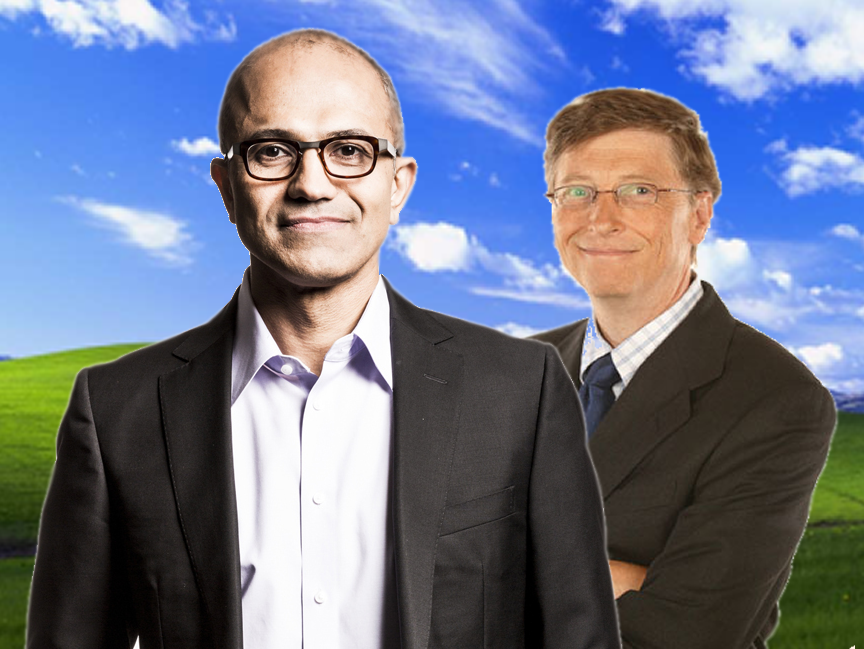You won't believe what happened when Microsoft made Bill Gates its "Technology Advisor"


The news of Gates returning to be more actively involved at Microsoft as part of Ballmer stepping down and Satya Nadella stepping up had been niggling at me for a while until I managed to place my concerns.
Nellie
One aspect -- actually not my biggest concern, I'll get to that -- is this strange implication that Satya somehow needs handholding.
Even in his own email on his first day as CEO, he says: "I’ve asked Bill to devote additional time to the company, focused on technology and products".
There's a thread running through the closing days of this transition which sounds very much like Microsoft believes Bill somehow needs to "save" them.
Why does Nadella need this help? Surely he knows what he's doing? Right?
Hopefully this is just a messaging problem, because if you take this to a natural conclusion the impression you get is that the board wants to bring Gates back in through the back door and Satya is just a stepping-stone for doing that. But I can't believe that. Perhaps it's a sop to the shareholders to make them feel more comfortable.
Anyway, on to my bigger concerns...
Spotty vision
We know that Gates has been putting his effort into the Gates Foundation since he stepped down as full-time CEO in June 2008. But we also know he's been involved in the company he founded since that time. So for nearly six years, he still has been involved. He has still been influencing the products.
To remind you of what Nadella said, he wants help from Gates on products.
If I were Nadella and Gates asked me if he could be my "technology advisor", I'd be questioning his credentials. On the one hand, I would see is someone who fully understands "enterprise IT", and has created a successful business off of the back of that understanding.
On the other hand, the one that's not about enterprise IT and more about baristas checking their Facebook at work on their iPhones, or soccer mums checking work emails whilst picking up Little Johnny, I would see someone who has not covered himself in glory.
Tablet PCs, Kin, Windows Phone, and Bing all stand out as examples of non-enterprise-IT products that have been absolutely and completely smoked by competition. I'm sure I could come up with more examples and, no, Xbox doesn't count.
Where's the evidence of the killer competence on the non-enterprise-IT side that's evident on the enterprise-IT-side?
Changes
We know that Microsoft is essentially hopeless on consumer products. You can argue against that statement as much as you like, the fact remains that how, where, what, and why people use computers has changed over the past six years. That's the thing to examine and measure, not whether market share is growing, or whether technologists like it.
Go into any coffee shop, and observe that every single table has a smartphone or tablet on it. Go and pick the kids up from school, and watch the other mums and dads killing time with their smartphones. Go into a meeting and watch people check emails iPads. In every single case you can think of we can go out into society see devices and software where there previously was none.
The problem is much more simple than people think. It's not "enterprise vs consumer", or "devices and services", or any of these things. It's that our industry has grown beyond enterprise IT.
Where's six years ago the computing industry universe was yay big and Microsoft essentially took up all of the space in that universe, the societal changes that have rippled out of the introduction of cheap, always-available, always-connected, ubiquitous computing devices has caused inflation within that universe to occur. That inflation looks very much like the ballooning of the early universe that happened after the big bang.
Previously the whole universe was filled with Microsoft. Microsoft was all about enterprise IT, ergo it ruled the universe because that was all there was. Now the universe is much, much bigger, and it's available to have the totality of our digital lives played out within.
Featured
Hopefully it's not stretching the analogy, but nature abhors a vacuum and now we see new players filling out that new space. Microsoft is still massive, and important, and fantastic, but unless they understand the sociological forces, they'll get nowhere.
As a business, one option is to grow into that new space. The other, my preferred option if I'm being honest, is that they don't.
So what's the deal? Does the Nadella+Gates combo mean that Microsoft is going to focus on enterprise IT, work on just that core business, and keep it safe? That for me works fine.
But if the idea of this is that Gates is the person who can lead Microsoft out into a greater universe where enterprise IT plays a tiny role?
I can't see that working so well.
What do you think? Post a comment, or talk to me on Twitter: @mbrit.